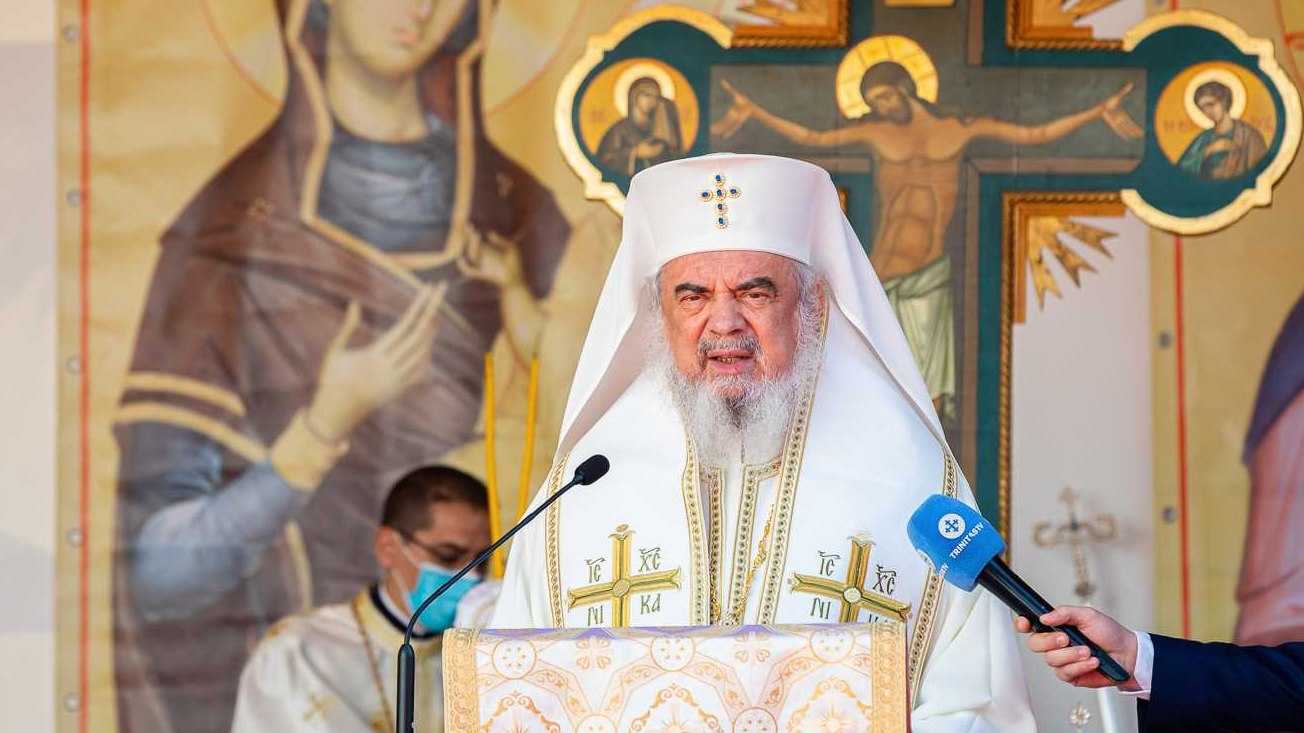
“Christ does not ask us to carry the cross alone, but to carry the cross following Him, that is, asking for His help and carrying the Cross with Him,” Patriarch Daniel said on Sunday. On the Sunday after the Exaltation of the Cross His Beatitude Patriarch Daniel offered his reflections on the four stages of salvation.
The Patriarch of Romania defined salvation as “the realisation of the communion or living relationship of the mortal human being with the immortal God” and as “the acquisition of eternal life from God, Who is the source of eternal life.”
The first step: free will
The first step to salvation is a free choice: Only he who wills is called to follow Christ in this way. “Here we see that the Saviour Jesus Christ respects human freedom. He proposes but does not impose. He offers salvation but does not force anyone to follow Him,” the Patriarch noted.
“The freedom that the Saviour emphasises shows us that in fact, God respects our freedom because only when God’s love is freely accepted then communion with Him is genuine.”
“God offers His love and wants man to respond freely to His love, not compulsorily or forcibly,” the Patriarch added.
The second step: self-denial
Patriarch Daniel pointed out that “self-denial was translated as self-negation in some modern foreign languages.” Yet, His Beatitude emphasised, “self-denial does not mean a depersonalisation, an abolition of the person, but a renewal of life, a change of life.”
“Let us not become the centre of our love because this is passionate self-love,” the Patriarch said. “By self-denial, the man who follows Christ is resurrected spiritually; he comes out of the grave of his own selfishness and becomes filled with the merciful and humble love of Christ.”
“So, self-denial is a struggle to free oneself from selfishness and a struggle to grow in a merciful and humble love for one’s fellow people. Therefore, this self-denial is a healing of a vision of selfish life. From this point of view, only self-denial makes a person open to gratitude before God and to the goodwill to help his fellows,” Patriarch Daniel underscored Sept. 19.
The third step: accepting the Cross
“When we speak of the cross of every man’s life, the cross has many spiritual meanings,” His Beatitude noted.
- The cross as suffering “can mean a sad, orphaned childhood, a troubled youth or an unhappy marriage.”
- The cross as a failure and the struggle to turn this professional or personal failure into a spiritual victory.
“Because of sin, man, although he proposes great ideals, often cannot fulfil them and experiences the feeling of failure, of non-fulfilment. But, in Christ, these failures turn into spiritual victories,” Patriarch Daniel emphasised.
- The cross as a struggle or toil represents “the effort to sanctify life by prayer and good works.”
“For example, the effort to start a family and raise children in the faith. Or, for someone who has become a monk, it means being obedient, humble, and a constant intercessor. So here the cross is a struggle against selfishness, for the cultivation of humble and merciful love both in the conjugal family and in the monastic family,” the Patriarch explained.
The fourth step: following Christ
“Christ does not want people to suffer, but through the suffering in man’s life, He wants man to draw closer to God and, above all, to ask for His help,” His Beatitude said.
“All sins are selfish and possessive love. The love of Christ overcomes the sins of humans because it is humble and merciful love,” His Beatitude Patriarch Daniel summed up.
“We have this mystery of the Cross as the light of life,” the Patriarch of Romania added. “The cross carried by faith in Christ and following the will of Christ, we reach the Resurrection, the victory. We turn suffering into victory, loneliness into communion, and suffering into hope.”
“So, in the Cross is hidden the power of the Resurrection of Christ, and the Resurrection shows the glory of the Holy Cross. How do we know this? We see that the Saviour Jesus Christ, though risen from the dead, keeps the marks of the Cross in His risen, glorified body, which ascended into heaven. He internalised the Cross as the experience of His sacrificial and obedient love of God.”
“Those who went through suffering carried the cross with the thought of Christ were spiritually strengthened and spiritually enriched. They felt through suffering the power of faith. They felt the help of Christ as a result of prayers to Him, and felt the joy of victory over the trials of life,” the Patriarch also said.
But that bearing the cross of suffering in revolt and without following Christ is of no use to us, His Beatitude also said. “Christ the Lord does not want us to suffer. He does not rejoice when someone suffers, but through these trials or hardships of life, He calls us to draw closer to God.”
Photography courtesy of Basilica.ro Files / Mircea Florescu

Δεν υπάρχουν σχόλια:
Δημοσίευση σχολίου
Σημείωση: Μόνο ένα μέλος αυτού του ιστολογίου μπορεί να αναρτήσει σχόλιο.